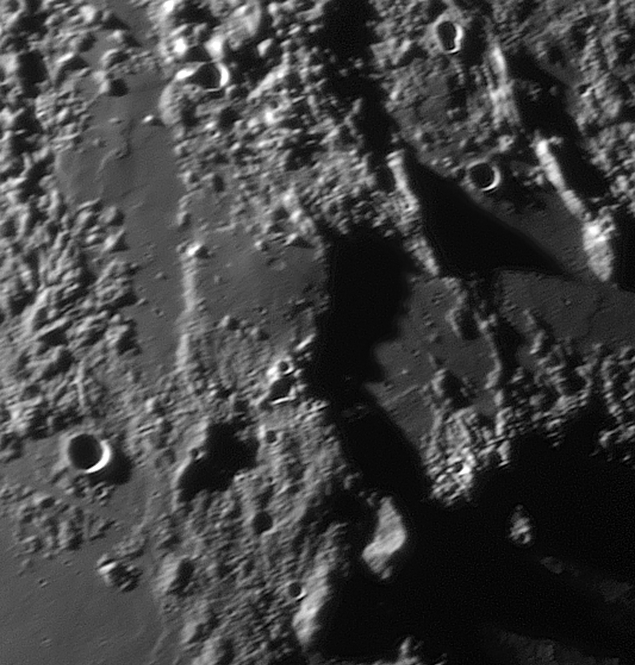
image by Wes Higgins
The Lunar 100 objects are arranged from easiest to most difficult to see. L100 is a swirl that is actually centered just around the east limb of the Moon, but the brightness extends our way and can be seen fairly often. L99, a volcanic depression named Ina, is much better placed for observation on the backslope of the Apennine Mountains. But its small size - about 3 km across, with an exceedingly shallow depth of 30 m -makes it nearly impossible to see from Earth. In fact, it was unknown until Apollo astronauts photographed it from lunar orbit. But now it has been imaged by amateur astronomer, imager extraordinaire Wes Higgins. This is one of the most difficult objects to see from Earth, but Wes has captured the characteristic D-shaped depression Ina, and even the suggestion that Ina is at the summit of a broad, low dome - see the slight curved brightening to the left. Ina was first called a caldera - a type of collapse crater that occurs on top of volcanoes. But Pete Schultz and Carle Pieters of Brown University think that it may be formed by gasses - perhaps radon - escaping from the Moon. Apollo’s super high resolution images reveal that the floor of Ina is filled with small delicate features that would have been destroyed by random micrometeorite cratering if the depression were older than a million years or so. And the amount of iron in Ina’s surface rocks is high, but it too would have been reduced by space weathering if Ina were not very young. Finally Apollo 17 astronauts noticed that Ina looks brighter through a blue filter, which may be a way for more amateur imagers to capture this elusive depression.
Technical Details:
September 14, 2006, 18″ Starmaster reflector, 4x Powermate, Infinity 2-1M camera, stack of 360 frames.
Related Links:
Rükl plate 22
Wes’ website
The Moon’s last gasps
A blue beacon
Now you can support LPOD when you buy ANY book from Amazon thru LPOD!
COMMENTS?
Click on this icon File:PostIcon.jpg at the upper right to post a comment.



